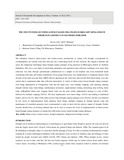Please use this identifier to cite or link to this item:
https://cris.library.msu.ac.zw//handle/11408/1213Full metadata record
| DC Field | Value | Language |
|---|---|---|
| dc.contributor.author | Jerie, Steven | - |
| dc.contributor.author | Matanga, E. | - |
| dc.date.accessioned | 2016-05-04T15:30:31Z | - |
| dc.date.available | 2016-05-04T15:30:31Z | - |
| dc.date.issued | 2011 | - |
| dc.identifier.issn | 1520-5509 | - |
| dc.identifier.uri | http://hdl.handle.net/11408/1213 | - |
| dc.description.abstract | The imbalance between ethno-science and techno-science mechanisms in coping with drought, accompanied by overdependence on external relief and food aid was a motivating factor for this research. The sought to identify and assess the indigenous knowledge based drought coping strategies being practised in Mberengwa District in Southern Zimbabwe. This was a case study in which both quantitative and qualitative data collection techniques were used. Data collection was done through questionnaires administered to a sample of one hundred and seven household heads constituting both male and female respondents. Focus group discussions were administered to communal farmers from all parts of the study area and three AREX officers operating in the ward were interviewed. Field observations were also carried out to complement other data collection instruments. A variety of ethno-science based drought coping strategies were being implemented in Chingechuru ward and the major ones were multiple cropping, early planting, planting drought tolerant crops, basin tillage, transhumance movement, supplementary feeding, destocking, deep welling, barter trade, selling/hired labour and begging. Barter trade was the most widely implemented strategy at a rate of 66%, followed by multiple cropping (62.8%). The least implemented were basin tillage (15.8%) and abiding to traditional leaders’ advice (16.1%). Most of the ethno-science based drought coping strategies were effective, but this was hindered by low levels of implementation. Early planting, basin tillage, multiple cropping of drought tolerant crops and maintenance of controlled granaries were recommended in order to deal with the adverse impact of drought. Further research should focus on devising methods that can be used to increase the levels of implementation of ethno-science based drought coping strategies in conjunction with techno-science based drought coping strategies. | en_US |
| dc.language.iso | en | en_US |
| dc.publisher | Clarion University of Pennsyslavia | en_US |
| dc.relation.ispartofseries | Journal of Sustainable Development in Africa;(Vol. 13, No.4; p. 395-409 | - |
| dc.subject | Ethno-science, techno-science, drought mitigation, indigenous knowledge systems | en_US |
| dc.title | The effectiveness of ethno-science based strategies in drought mitigation In Mberengwa district of southern Zimbabwe | en_US |
| dc.type | Article | en_US |
| item.fulltext | With Fulltext | - |
| item.languageiso639-1 | en | - |
| item.openairecristype | http://purl.org/coar/resource_type/c_18cf | - |
| item.grantfulltext | open | - |
| item.openairetype | Article | - |
| item.cerifentitytype | Publications | - |
| Appears in Collections: | Research Papers | |
Files in This Item:
| File | Description | Size | Format | |
|---|---|---|---|---|
| The Effectiveness of Ethno-Science Based Strategies in Droug1.pdf | 108.85 kB | Adobe PDF |  View/Open |
Page view(s)
20
checked on Jul 26, 2024
Download(s)
8
checked on Jul 26, 2024
Google ScholarTM
Check
Items in MSUIR are protected by copyright, with all rights reserved, unless otherwise indicated.



